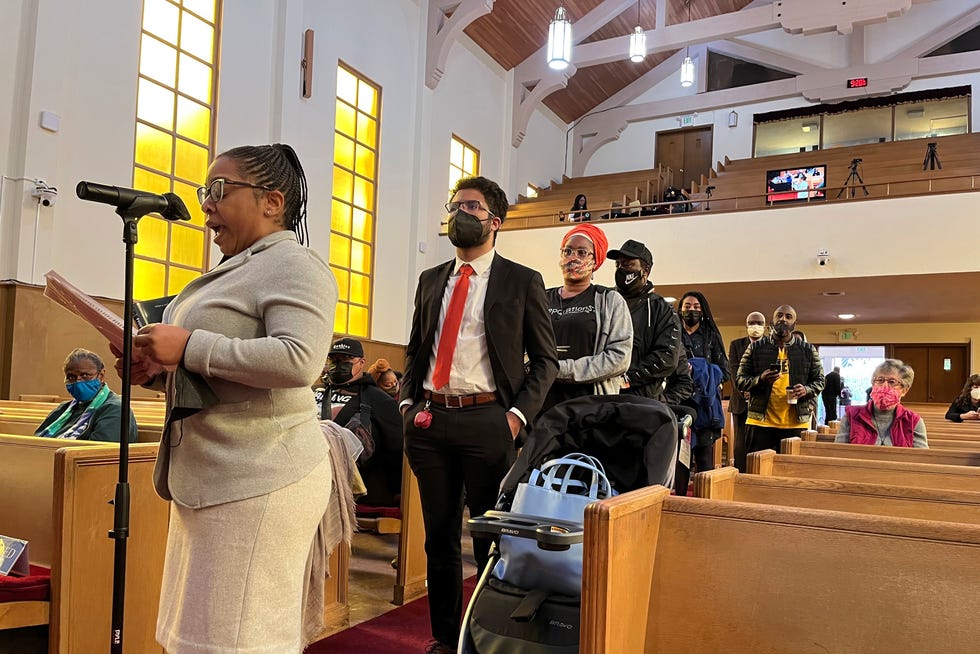California calls for reparations, harm of slavery, Black oppression
Written by ABC Audio All Rights Reserved on June 4, 2022


- California’s first-in-the-nation reparations task force is calling for reparations for centuries of mistreatment of Black residents.
- The report is the most detailed examination of the governmental and societal failures toward Black Americans since 1968’s Kerner Commission.
- The panel will unveil a pathway for a reparations when it finishes its term next year.
LOS ANGELES – The harm to African Americans that started with slavery persists to this day through systemic discrimination that requires California to make “comprehensive reparations” and extensive reforms in housing, education and the justice system, according to a sweeping report released Wednesday by a first-in-the-nation state reparations task force.
The panel, whose recommendations pertain to California, also urged the creation of a special office charged with providing a pathway for financial reparations for Black residents.
At nearly 500 pages, the task force interim report extensively chronicles centuries of racial oppression from the start of slavery here in the 1600s to present-day inequities experienced by Black Americans in California and the rest of the country. It includes recommendations for repairing the damage in more than a dozen categories.
The findings, issued midway through the nine-member panel’s two-year term, come just as social justice organizations are pressing the White House to form a federal commission to study and develop reparations proposals for African Americans.
Members say it is the first government-commissioned detailing of transgressions against Black Americans since the federal Kerner Commission report in 1968.
The history of slavery, Jim Crow, segregation and other discrimination against Black Americans detailed in the report lays out the reasons a reparations program is needed, task force member Lisa Holder said.
“The depth, breadth and scope of the report is astounding,” Holder said. “We are evaluating racism beginning in 1619 and going all the way to the present … and connecting (past) injustices to injustice that we are seeing today.”
TASK FORCE:Will California become the first state to pay Black people reparations?

The report recounts what it calls “the horrors and harms perpetrated against Black Americans in California and the nation,” explains the existence of a huge wealth gap and argues for reparation payments, a contentious issue in which opinion has been divided by race. According to a 2019 Gallup poll, Black Americans widely supported reparations, while white Americans substantially opposed it.
More than 150 years after slavery was abolished, its legacy remains “embedded in the political, legal, health, financial, educational, cultural, environmental, social and economic systems of the United States,” the report states.
RACIAL INEQUITY:12 charts show how racial disparities persist across wealth, health, education and beyond
It argues that unequal treatment instituted by federal, state and local governments over centuries has created a huge wealth gap between Black and white Americans that requires financial remedies such as reparations. “Segregation, racial terror, harmful racist neglect, and other atrocities in nearly every sector of civil society have inflicted harms, which cascade over a lifetime and compound over generations,” the report says.

The most complex determinations, including proposals for the size, structure and logistics of a reparations plan, will come in a final report next year to California’s legislature and governor, who appointed the panel’s members and ultimately will decide on its recommendations. The panel, which includes lawmakers, lawyers, academics and civil rights activists, includes one non-Black member, Donald Tamaki, a Japanese American who worked to overturn the conviction of Fred Korematsu, who resisted internment during World War II and whose case played a key role in gaining reparations for Japanese Americans.
The task force, which has held numerous hearings in the past year, made a big reparations decision in March, voting 5-4 to restrict compensation to descendants of enslaved and free Black people who were in the U.S. in the 19th Century.

The interim report’s recommendations focus on California, but the work taking place in the nation’s largest state is being looked at as a potential model for reparations efforts in other parts of the country and as a way to build momentum for a reparations bill that has been introduced for decades in Congress.
“There’s a history of policies first being championed in California and then being replicated throughout the states and even by the federal government,” task force Chair Kamilah Moore said. “I hope that reparations for African Americans is one of those policy issues that … will reverberate to other states and to the federal level, as well.”
Deep-blue California, which entered the union as a free state in 1850 but enforced fugitive slave laws, comes in for harsh criticism in the report for policies and practices that have discriminated for years against Black Americans, although task force members credit the state for its groundbreaking effort to consider reparations.
Chapter titles convey the physical, verbal and emotional violence experienced by Black Americans: “Enslavement”; “Racial Terror”; “Political Disenfranchisement”; “Separate and Unequal Education”; “An Unjust Legal System”; and “Pathologizing the Black Family.”
The report includes a broad range of preliminary recommendations, including increasing access to parks and public transportation in Black neighborhoods; stopping banking and mortgage-related discrimination; establishing a free tuition initiative and adopting a school curriculum that includes a more expansive discussion of the experiences of Black Americans.
Although much hard work remains, California task force member Holder hopes the interim report can help boost a reparations effort that gained support in the social justice movement that arose in 2020 following the police killings of George Floyd, Breonna Taylor and other Black people. However, the report also comes at a time of increased backlash regarding the teaching of racial history, with other states considering legislation restricting educational curriculums.
“We’re really trying to correct the historical record, to reimagine the narrative in a way that is truly inclusive of people of color,” Holder said.
The post California calls for reparations, harm of slavery, Black oppression appeared first on Correct Success.






